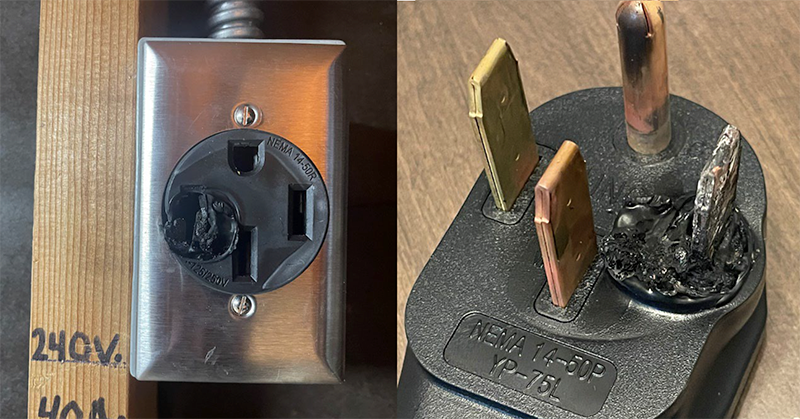Porsche, the iconic carmaker known for it’s performance vehicles, is facing legal trouble over it’s PMC+ and PMCC EV chargers. Owners allege that a recent software update has cut the maximum output of the charging devices in half.
The software update from Porsche has caused a major setback for it’s electric vehicle owners. Instead of improving the charging times of their cars, the update has actually doubled the time it takes to charge.
As a result, this limitation severely impacts the ability of it’s customers to use their EV’s when needed and as advertised.
Let’s take a closer look into the Porsche EV charger problem, and what it means for customers long-term.
Porsche Owners Allege PMC+ and PMCC Charging Devices Are Defective
Electric cars have been touted as the future of transportation, with a growing number of people turning to them as a way to reduce their carbon footprint.
Porsche has also jumped on the electric car bandwagon, with the launch of the Taycan, E-Hybrid Cayenne, and Panamera vehicles.
One of the great perks of owning an electric vehicle (EV) is the convenience that comes with charging it at home.
To facilitate home charging, Porsche offers two devices, the Porsche Mobile Charger Plus (“PMC+”) and the Porsche Mobile Charger Connect (“PMCC”).
However, these devices have come under scrutiny for their potential of being a fire hazard.
In fact, Porsche owners and lessees started noticing that the PMC+ and PMCC devices often became extremely hot to the touch while charging.
For some, the supply cables and plugs became so hot that they melted the NEMA industrial electrical outlets they had installed specifically for EV charging.

Without getting too technical here, NEMA industrial electrical outlets are designed to withstand a wide range of voltages, depending on their rating.
There are many different types of NEMA industrial electrical outlets, each with its own voltage rating. For example, a NEMA 5-15R outlet, which is commonly used in residential and commercial settings, is rated for 125 volts AC and 15 amps.
On the other hand, a NEMA 14-50R outlet, which is commonly used for electric vehicle charging, is rated for 240 volts AC and 50 amps.
As such, NEMA industrial electrical outlets, such as the NEMA 14-50R outlet, are commonly used for electric car charging because they are designed to handle high power loads and provide a safe and reliable connection.
The NEMA 14-50R outlet is a 240-volt outlet with a rating of 50 amps, which allows it to provide up to 12,000 watts of power. This makes it well-suited for electric car charging.
However, in response to owners complaints about overheated charge cables and plugs, Porsche asked customers to bring their PMC+ and PMCC charging devices to dealerships.
It’s alleged that technicians would change the charging device settings to cut the maximum output current in half. Porsche then released a software update for the chargers with the same effect.
While this may seem like a reasonable solution to the overheating problem, it caused vehicle charging times to double.
As one can imagine, this is a significant inconvenience for those who rely on their electric and hybrid Porsche vehicles for daily commuting or other activities.
Furthermore, the potential fire hazard caused by these charging devices is a serious concern that should not be taken lightly.
Owners Claim Charger Update Significantly Lengthens Charging Time
The PMC+ and PMCC can charge at two different rates, Level 1 and Level 2.
Level 1 charging uses a 120-volt outlet, the standard in American homes. Level 2, however, uses a 240-volt outlet, which requires an industrial electrical socket.
Porsche recommends using a specific industrial outlet called the NEMA 14-50 socket for Level 2 charging.
However, this type of outlet requires additional installation costs, which are not included with the Taycan or E-Hybrid models.
Fact is, to fully charge the car in the advertised 9.5 to 10.5 hours, Porsche recommends using Level 2 charging with a 240-volt industrial outlet that can deliver 40 amperes of current.
If an owner or lessee of a Taycan or E-Hybrid uses a standard 120-volt outlet, they will experience reduced charging power and a significantly longer charging time than with the Level 2.
However, after a post-sale software change, the devices can only safely charge at half of their advertised rate.
As a result, consumers who purchased the charging devices have paid for functionality that Defendants advertise, but that their devices cannot safely provide.
As such, customers have been disappointed as they expected to be able to charge their vehicles overnight and have a fully charged vehicle ready for them in the morning.
Status of the Porsche PMC+ and PMCC Charger Class Action Litigation
This is an active class action lawsuit. This suit has been brought on behalf of the Plaintiffs and a class of current and former Taycan, E-Hybrid Cayenne, and Panamera vehicle owners and lessees.
Bauser et al v. Porsche Cars North America, Inc.
According to the lawsuit, Porsche was aware of the overheating issues with the PMC+ and PMCC on or around August 19, 2022.
Despite being aware of the problem, Porsche did not take responsibility for repairing or replacing the affected devices. Instead, they instructed drivers to bring their products in for a software update that would limit the devices’ default configuration to accept only 20 amps of current.
Questions About This Lawsuit?
MyCarVoice.com is not counsel or the settlement administrator in this class action lawsuit. Our goal is to inform owners of these vehicles of the recent lawsuit. This post will be updated when/if new suit information is released.
Please considering subscribing to this post for critical updates.
Have you owned or leased a vehicle manufactured by Porsche and experienced problems with the PMC+ and PMCC charging systems? If so, add your voice to this post in the comments below.
Add your car complaint for review

Managing Editor
Christopher is an automotive technical writer. When he’s not at the local autocross event, he can often be found working on one of his cars. Specializes in automotive class action law, industry trends, and automotive maintenance. Email me direct, or learn more about us

